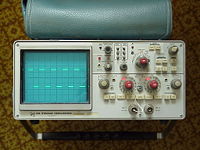434: Difference between revisions
Jump to navigation
Jump to search
No edit summary |
No edit summary |
||
| Line 6: | Line 6: | ||
There is a chopped two channel system and the fastest sweep time is 20nS/div. | There is a chopped two channel system and the fastest sweep time is 20nS/div. | ||
An option for a tube with higher sensitivity at high writing speeds was available too. | An option for a tube with higher sensitivity at high writing speeds was available too. | ||
The signal passes through rotary cam-operated input attenuators, then a JFET source-follower buffer | |||
that uses a [[2N5911|2N5911A]] (Tektronix part number 151-1032-00). | |||
* [http://w140.com/tektronix_434_service.pdf Tektronix 434 Manual (complete, PDF)] | * [http://w140.com/tektronix_434_service.pdf Tektronix 434 Manual (complete, PDF)] | ||
Revision as of 21:23, 20 December 2012
The 434 is a analog CRT storage scope with two independent storage areas on the screen. It has a bandwith of 24 MHz and uses a tunnel diode in its trigger circuit. The storage is done in the CRT itself, by trapping charge on a special fine grid of isolated pads behind the phosphor where the electron beam is then blocked or released.
There is a chopped two channel system and the fastest sweep time is 20nS/div. An option for a tube with higher sensitivity at high writing speeds was available too.
The signal passes through rotary cam-operated input attenuators, then a JFET source-follower buffer that uses a 2N5911A (Tektronix part number 151-1032-00).





